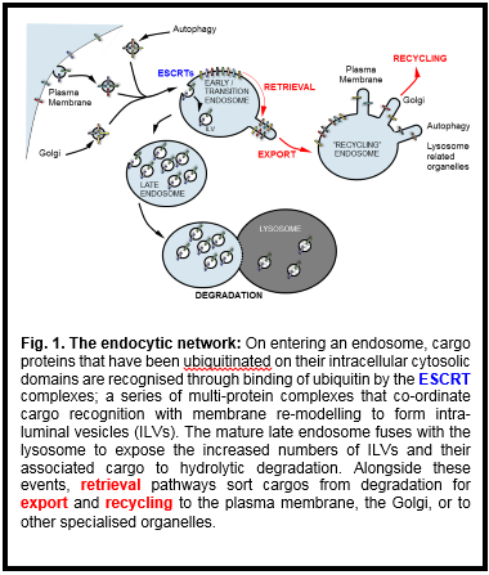MRC INTEGRATIVE EPIDEMIOLOGY UNIT (IEU)
SEMINAR SERIES
Tuesday, 13th September, 2016
16.00 – 17.00 – Room BG10, Oakfield House
Peter Cullen, Professor of Biochemistry
Wellcome Trust Senior Investigator
University of Bristol
“Mechanistic details of endosomal cargo sorting in health and disease”
Abstract
Importance: Approximately 25% of the human genome encodes for integral membrane proteins1. Efficient intracellular transport of these proteins, and associated proteins and lipids (together termed cargos), is essential for organelle biogenesis, maintenance, and quality control2. This is an extensive field that encompasses the secretory, endocytic and autophagic pathways, all fundamental features of eukaryotic cells. Efficient integration of these pathways is essential for cellular organisation and function, with errors leading to numerous diseases including those associated with ageing and neurodegeneration3. A central challenge in cell biology is to understand the molecular complexities of how cargo-transport is achieved and how defects contribute to the pathoetiology of human disease.
Our specific focus: To maximise the impact of our science we have focused our efforts on elucidating key mechanistic details of cargo sorting through the endocytic network
(Fig. 1)  . Historically this field has been dominated by a focus on describing the molecular details of endocytosis4 and of cargo sorting into the lysosomal degradative pathway5. We have broken new ground by illuminating a ‘black box’ in our knowledge: the molecular details that govern cargo retrieval from the degradative fate and their export and recycling to various compartments6. Our molecular and functional analysis of retromer7 has helped establish this as an ancient, master regulator of endosomal cargo retrieval, export and recycling(e.g. 8-14). In turn, this increasingly influential body of work is providing the hypotheses and approaches to define how subtle perturbations in retromer’s activity over many years can lead to poorly defined cellular alterations that lead to neurodegeneration15-17.
. Historically this field has been dominated by a focus on describing the molecular details of endocytosis4 and of cargo sorting into the lysosomal degradative pathway5. We have broken new ground by illuminating a ‘black box’ in our knowledge: the molecular details that govern cargo retrieval from the degradative fate and their export and recycling to various compartments6. Our molecular and functional analysis of retromer7 has helped establish this as an ancient, master regulator of endosomal cargo retrieval, export and recycling(e.g. 8-14). In turn, this increasingly influential body of work is providing the hypotheses and approaches to define how subtle perturbations in retromer’s activity over many years can lead to poorly defined cellular alterations that lead to neurodegeneration15-17.
Pushing the ‘state-of-the-art’: While the central role of retromer is increasingly recognised, a major unanswered question relates to the mechanism(s) of retromer-independent cargo sorting. Answering this question constitutes a major hurdle for the field: (i), it is an essential step towards achieving a detailed mechanistic understanding of endosomal cargo sorting; (ii), increased mechanistic understanding will provide further insight into de-regulated endosomal sorting in human disease; and (iii), as evidence continues to reveal retromer's role in age-related neurodegenerative disease19, understanding the integration of retromer-dependent and retromer-independent pathways is likely to provide rationale routes for therapeutic strategies that exploit endosomal plasticity to compensate for retromer dysfunction.
The retromer-like complex: We have discovered a previously unrecognised protein assembly that orchestrates retromer-independent endosomal retrieval, export and recycling of cargo proteins that include β-integrins and LDL (low-density lipoprotein) receptors. We have termed this complex ‘retromer-like’. By describing retromer-like’s role in sorting of LDL receptors and through preliminary neurogenetic analysis in familial forms of Parkinsons disease, we have obtained new glimpses into the molecular basis of hypercholesterolaemia and neurodegenerative disease, which we have extended into host:pathogen interactions by revealing a role for retromer-like in the endosomal sorting of L2 capsid protein during infectivity with human papilloma virus types.
Biography
Peter Cullen is Professor of Biochemistry and Wellcome Trust Senior Investigator at the University of Bristol. His research career has focused on studying inositol-based cell signalling in particular elucidating the role of phosphoinositides (1-5). Recent work is helping to transform our perception of how the endosomal network serves to sort hundreds of transmembrane receptors, channels and transporters to a variety of cellular organelles, and the importance of these events for cell, tissue and organism physiology (6-12). In particular, on going analysis of retromer is providing the framework for interpreting its neuroprotective role in Parkinson’s and Alzheimer’s disease (13-15). His research is characterised by its technical breath, from structural analysis and in vitro reconstitution through to functional analysis in cell culture, patient-derived samples, and model organisms, and the use of rigorous and quantitative methodologies. His awards include: 2010 Biochemical Society Morton Lecture, 2011 Stanley Lecture, and 2015 Wellcome Trust Senior Investigator Award. He has served on funding committees in the UK, Europe and USA, various Institutional quinquennial review boards and is a member of The Babraham Institute SAB. Eight lab alumni run their own independent laboratories.
1. Cullen et al: Nature 376, 527 (1995).
2. Venkateswarlu et al: Curr Biol 8, 463 (1998).
3. Lockyer et al: Curr Biol 11, 51 (2001).
4. Bivona et al: Nature 424, 694 (2003).
5. Walker et al: EMBO J 23, 1749 (2004).
6. Carlton et al: Curr Biol 14, 1791 (2004).
7. Traer et al: Nat Cell Biol 9, 1370 (2007).
8. Wassmer et al: Dev Cell 17, 110 (2009).
9. Harterink et al: Nat Cell Biol 13, 914 (2011).
10. van Weering et al: EMBO J 31, 4466 (2012).
11. Steinberg et al: Nat Cell Biol 15, 461 (2013).
12. Gallon et al: Proc Natl Acad Sci USA 111, E3604 (2014).
13. McGough et al: Curr Biol 24, 1670 (2014).
14. Wang et al: Nat Med 22, 54 (2016).
15. McMillan et al: J Cell Biol 214, 389 (2016).
ALL WELCOME
